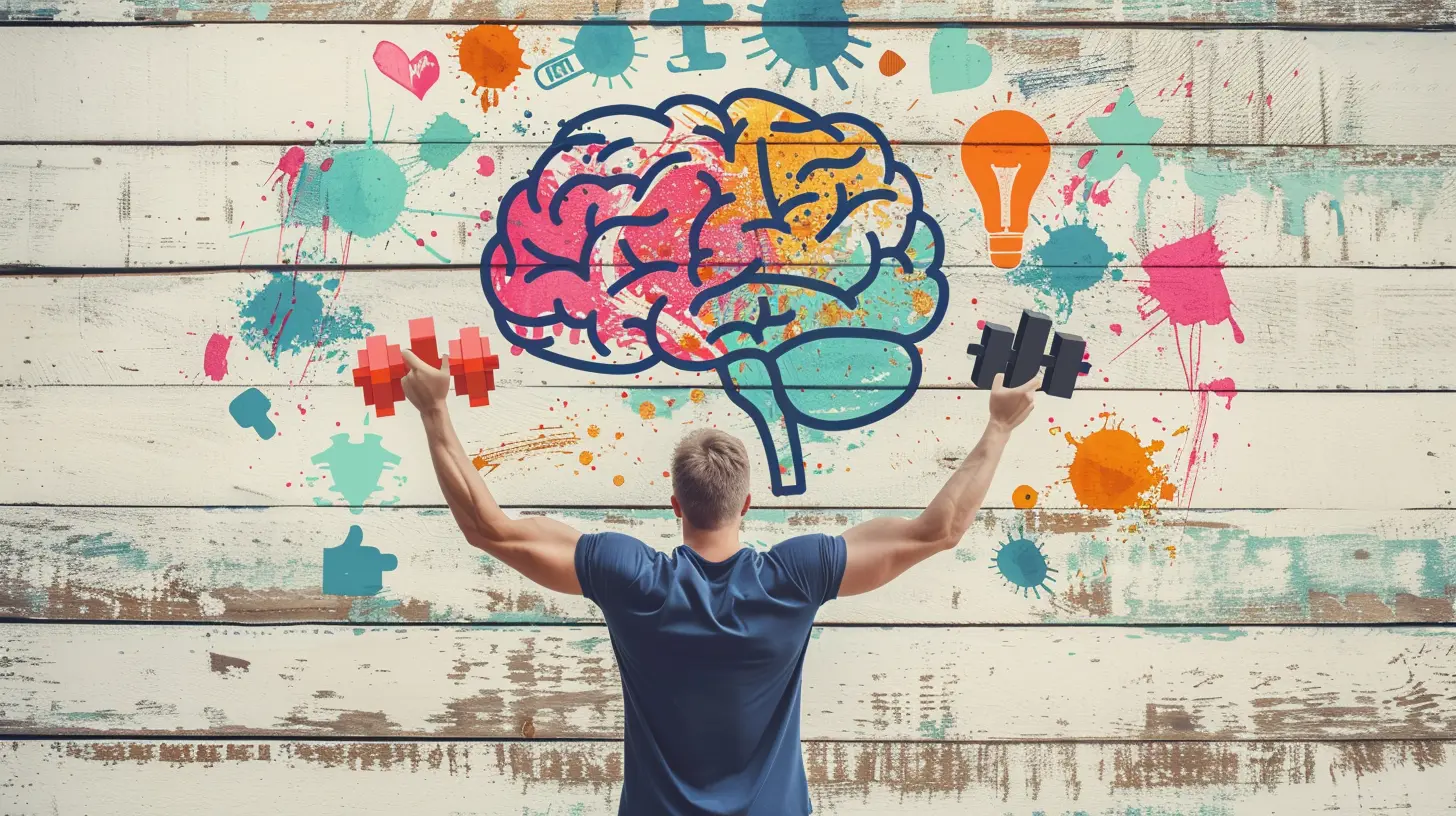The Impact of Physical Exercise on Mental Well-being
23 October 2025
Let’s face it—we all know that exercise is good for our bodies. It tones our muscles, helps us fit into those jeans from five years ago, and makes climbing stairs feel less like an Olympic sport. But what about your mind? Yep, your brain is secretly obsessed with movement, and we're not just talking about pacing around during an awkward phone call.
In this post, we’re diving (yoga-mat-first) into how physical exercise impacts mental well-being. Spoiler alert: it’s way more powerful than an overpriced latte on a Monday morning.
Why Your Brain Cheers Every Time You Move
We often treat our brains like they’re some separate, mysterious entity floating around, completely detached from the rest of our body. But newsflash: your brain is part of your body. I know, wild, right?So, when you move—whether it’s chasing your dog around the yard, hitting the gym, or breakdancing in your kitchen—your brain perks up like it just got a caffeine shot. It's a complex little organ, and movement fires it up in all the right ways.
Mental Perks That'll Make You Want To Sweat (Even Just a Little)
1. Say Buh-Bye to Stress
Let’s start with the obvious: stress. It’s like that clingy ex who just won’t leave you alone. But guess what? Exercise helps you ghost stress like a pro.When you break a sweat, your body kicks out stress hormones (like cortisol) and ushers in feel-good chemicals like endorphins. These are basically your brain's version of high-fives.
You know that post-workout glow? That’s not just from sweat—it’s your brain feeling like it just got a warm hug.
2. Mood Swings, Be Gone!
Ever had one of those days where your emotions are riding a rollercoaster? One minute you're crying over a dog commercial, the next you're mad because someone looked at you wrong.Enter: Exercise.
Regular physical activity plays a key role in regulating mood. Think of it like a thermostat for your feelings. It helps stabilize emotions, reduce anxiety, and even combat the nasty symptoms of depression.
Even just a brisk 20-minute walk can flip the script on a bad day. It's not therapy, but it’s a solid sidekick.
3. Build Confidence Without the Ego Trip
Confidence isn’t just about liking what you see in the mirror (though, hey, that never hurts). It’s also about feeling capable, resilient, and in control of your life.Exercise gives you a sense of achievement, especially when you set and smash small goals. And nope, it doesn't require running a marathon. Getting up early to stretch or taking the stairs instead of the elevator can be enough to trigger that “heck yeah, I did it!” feeling.
Little wins = big boosts in mental well-being.
Brain Chemistry: A Love Letter to Movement
Let’s nerd out for a second. Ever heard of brain-derived neurotrophic factor (BDNF)? No? Well, it’s basically Miracle-Gro for your brain.Exercise increases BDNF levels, which supports brain plasticity (i.e., your brain’s superpower to adapt, learn, and grow). That means when you work out, you're not just building biceps—you’re literally rewiring your brain to be better at handling the curveballs life throws at you.
It’s like giving your brain a software update… except instead of waiting for it to download, you do squats.
Sleep Like a Rock (But Cooler)
Struggling with a racing mind at night? Counting sheep not cutting it? Maybe your body’s just begging for movement.Exercise helps regulate your internal clock (aka circadian rhythm), making it easier to fall asleep and stay asleep. And while we’re not claiming it's a cure for insomnia, moving your body during the day can signal to your mind, “Hey, we did a thing, it’s time to rest.”
Bonus: deeper sleep means better mood, sharper memory, and less daytime zombie-ing.
Anxiety and the Exercise Connection
Let’s talk anxiety—because who hasn’t dealt with that pesky mental monster at some point?Physical activity can act like a natural anti-anxiety treatment. During workouts, your focus shifts away from worries to what your body is doing. That grounded awareness is kinda like sneaky meditation in motion.
And if the thought of a packed gym makes you more anxious? Don’t worry. Simple activities like yoga, walking in nature, or dancing like no one’s watching in your PJ’s totally count. Movement is movement.
Can Sweat Actually Help Depression?
This might sound too good to be true, but studies (and loads of real-life examples) show that exercise can reduce symptoms of depression. We're not saying to throw out your meds—always follow professional advice—but pairing physical activity with traditional treatment can amplify results big time.Even better? It feels empowering. When depression tries to pull you under, each step, each stretch, each movement is an act of resistance.
The Social Sprinkle: Group Fitness and Mental Health
You know what else helps mental health? Other humans. (Yes, even on days when people seem extra annoying.)Group fitness classes, running clubs, or even just gym buddies create social connection. And social connection = mental well-being rocket fuel. You laugh, share goals, high-five strangers who weirdly become friends—and suddenly, you're not alone anymore.
Humans are tribal by nature. We heal better together.
Not a Gym Rat? That’s Cool, Let’s Get Creative
Exercise doesn’t have to mean sweaty treadmills and intimidating weight racks. Let’s think outside the gym box.- Take a Zumba class and pretend you’re on "Dancing with the Stars."
- Go hiking and pretend you're on a quest to destroy the One Ring.
- Bike to your favorite coffee shop (because caffeine is still important).
- Try paddleboarding and fall off a few times—laughing is therapy too.
If it gets your heart going and brings you joy, you’re on the right track.
How Much Exercise Do You Really Need?
Alright, let’s talk brass tacks: how much movement do you actually need to boost your mental game?According to experts (and yes, there’s science behind this), around 30 minutes of moderate exercise most days of the week can seriously level up your mental health. That’s it. You don’t need to become a triathlete.
Split it up, if you want—10 minutes here, 15 there. Think of it like adding spices to your day. A little pepper of push-ups. A sprinkle of stretching. Bam—flavor and benefits.
Movement Is Medicine, But It’s Not One-Size-Fits-All
Here’s the million-dollar truth: The best form of exercise is the one you’ll actually do.Don’t force yourself into a soul-sucking workout regimen that feels like punishment. That’s not sustainable or mentally healthy.
Instead, find your flavor:
- Love nature? Hike.
- Love music? Dance.
- Love solitude? Jog or stretch alone.
- Hate routines? Switch it up every week.
There’s no single recipe for success, and your body and brain will thank you for listening to what you love.
Tiny Habits, Major Shifts
You don’t have to transform your life overnight. Seriously. Just start small:- Take a walk after dinner.
- Set a 5-minute dance break alarm.
- Stretch while watching Netflix.
- Choose stairs over elevators once a day.
These micro-movements create momentum, kind of like rolling a snowball downhill. Before you know it, you’ve built a lifestyle that naturally supports mental clarity, emotional balance, and resilience.
Don’t Forget the Important Disclaimer: Be Kind to Yourself
Here’s your permission slip: skip a day without guilt. Rest is part of the mental well-being equation too.Yes, consistency matters, but beating yourself up over missed workouts? Not helpful. This journey’s about feeling better, not perfect.
So lace up those sneakers—or don’t. Just remember, every movement is a gift to your future self.
Final Thoughts: Move Your Body, Feed Your Mind
At the end of the day, physical exercise isn’t just about getting fit—it’s about feeling whole. It’s about giving your mind the clarity it craves and the joy it deserves. Whether you're sprinting marathons or walking a mile while chatting to your cat, your mental well-being is getting a boost with every step.So the next time you're feeling low, anxious, or stressed, try moving your body—even just a little. Your brain will throw a party. (And it totally won’t be awkward.
all images in this post were generated using AI tools
Category:
Self CareAuthor:

Paulina Sanders
Discussion
rate this article
1 comments
Tobias Moore
This article compellingly highlights the profound connection between physical exercise and mental well-being, illustrating how regular activity not only enhances mood but also fosters resilience against anxiety and depression.
November 10, 2025 at 4:57 AM

Paulina Sanders
Thank you for your insightful comment! I'm glad you found the article resonates with the important link between physical exercise and mental well-being.


